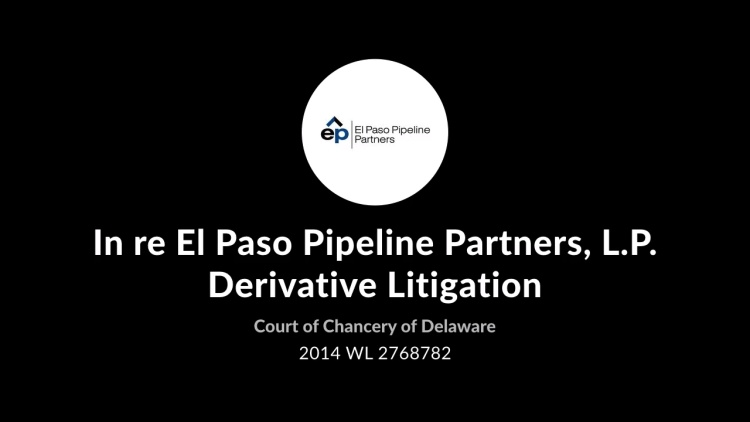In re El Paso Pipeline Partners, L.P. Derivative Litigation
Delaware Court of Chancery
2014 WL 2768782 (2014)

- Written by Sean Carroll, JD
Facts
El Paso MLP is a master limited partnership that has a corporate “sponsor,” El Paso Corporation (Parent). Parent owns 100 percent of El Paso MLP’s general partner (General Partner) (defendant). As the sponsor, in place for tax purposes, Parent initially contributed certain assets to El Paso MLP and subsequently sold other assets to El Paso MLP from time to time. These sales are known as “drop-downs.” In 2010, Parent offered to sell El Paso MLP interests in two liquid natural gas (LNG) companies: Southern LNG and Elba Express. The revenue of these two companies came primarily from contracts (Service Agreements) with subsidiaries of Shell and British Gas. Shell and British Gas could walk away from the Service Agreements, however, if they became unprofitable—the subsidiaries that were parties to the Service Agreements were essentially shell companies with no assets. These proposed transactions created a conflict of interest for the General Partner. El Paso MLP’s limited partnership agreement provided that in such a scenario, the transactions would need to be approved “by a majority of the members of the Conflicts Committee acting in good faith.” The Conflicts Committee obtained substantial information on Southern LNG and Elba Express, including details on the Service Agreements. After reviewing the information and meeting five times, the Conflicts Committee approved the transactions. Contemporaneously with Parent’s proposal to sell these LNG assets to El Paso MLP and while “touting their value,” Parent declined to exercise an option it had to purchase other LNG assets for itself at a more favorable earnings before interest, taxes, depreciation, and amortization (EBITDA) multiple. The Conflicts Committee was not aware of Parent declining this option. The plaintiffs brought suit in the Delaware Court of Chancery against the General Partner and its board of directors, arguing that the Conflicts Committee acted in bad faith by approving the Southern LNG and Elba Express transactions. The defendants filed a motion for summary judgment.
Rule of Law
Issue
Holding and Reasoning (Laster, J.)
What to do next…
Here's why 907,000 law students have relied on our case briefs:
- Written by law professors and practitioners, not other law students. 47,100 briefs, keyed to 996 casebooks. Top-notch customer support.
- The right amount of information, includes the facts, issues, rule of law, holding and reasoning, and any concurrences and dissents.
- Access in your classes, works on your mobile and tablet. Massive library of related video lessons and high quality multiple-choice questions.
- Easy to use, uniform format for every case brief. Written in plain English, not in legalese. Our briefs summarize and simplify; they don’t just repeat the court’s language.





